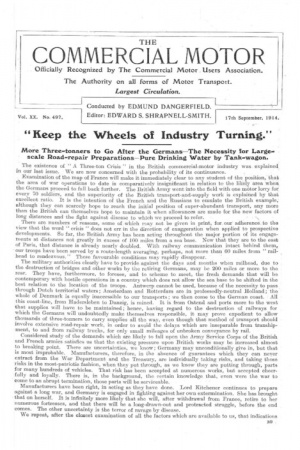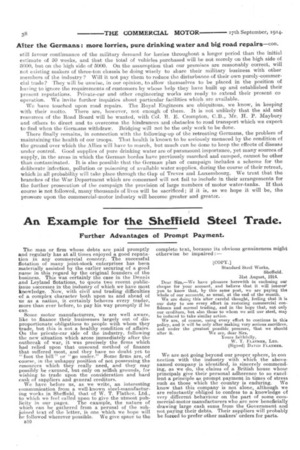" Keep the Wheels of Industry Turning."
Page 1

Page 2

If you've noticed an error in this article please click here to report it so we can fix it.
More Three-tonners to Go After the Germans—The Necessity for Largescale Road-repair Preparations—Pure Drinking Water by Tank-wagon.
The existence of "A Three-ton Crisis " in the British commercial-motor industry was explained in our last issue. We are now concerned with the probability of its continuance. Examination of the map of France will make it immediately clear to any student of the position, that the area of war operations to date is comparatively insignificant in relation to the likely area when the Germans proceed to fall back further. The British Army went into the field with one motor lorry for every 70 soldiers, and the superiority of the British transport-and-supply work is explained by that excellent ratio. It is the intention of the French and the Russians to emulate the British example, although they can scarcely hope to reach the initial position of super-abundant transport, any more than the British can themselves hope to maintain it when allowances are made for the new factors of long distances and the fight against disease to which we proceed to refer. There are numbers of reasons, some of which may not be given in print, for. our adherence to the view that the word " crisis " does not err in the direction of exaggeration when applied to prospective developments. So far, the British Army has been acting throughout the major portion of its engagements at distances not greatly in excess of 100 miles from a sea base. Now that they are to the east of Paris, that distance is already nearly doubled. With railway communication intact behind them, our troops have been served by a route-length averaging, perhaps, not more than 60 Miles from " railhead to rendezvous," These favourable conditions may rapidly disappear.
The military authorities clearly have to provide against the days and months when railhead, due to the destruction of bridges and other works by the retiring Germans, may be 200 miles or more to the rear. They have, furthermore, to foresee, and to scheme to meet, the fresh demands that will be contemporary with hostile operations in a country which does not allow the sea base to be shifted in the best relation to the location of the troops. Antwerp cannot be used, because of the necessity to pass through Dutch territorial waters; Amsterdam and Rotterdam are in professedly-neutral Holland,the whole of Denmark is equally inaccessible to our transports ; we then come to the German coast. All this coast-line, from Hadersleben to Danzig, is mined. It is from Ostend and ports more to the west that supplies will have to be maintained; hence, having regard to the destruction of railways for which the Germans will undoubtedly make themselves responsible, it may prove expedient to allow thousands of three-tonners to carry supplies all the way, even though that method of transport should involve extensive road-repair work, in order to avoid the delays which are inseparable from transhipment, to and from railway trucks, for only small mileages of unbroken conveyance by rail. Considered study of the demands which are likely to fall upon the Army Service Corps of the British and French armies satisfies us that the existing pressure upon British works may be increased almost to breaking point. There are uncertainties, we know; Germany may unconditionally give in, but that is most improbable. Manufacturers, therefore, in the absence of guarantees which they can never extract from the War Department and the Treasury, are individually taking risks, and taking those risks in the most-patriotic fashion, when they put through, as we know they are putting through, parts for many hundreds of vehicles. That risk has been accepted at numerous works, but accepted cheerfully and loyally. There is, in the background, the certain knowledge that, even were the war to come to an abrupt termination, those parts will be serviceable.
Manufacturers have been right, in acting as they have done. Lord Kitchener continues to prepare against a long war, and Germany is engaged in fighting against her own extermination. She has brought that on herself. It is infinitely more likely that she will, after withdrawal from France, retire to her numerous fortresses, and that there will be a long-drawn-out and protracted struggle, before the end comes. The other uncertainty is the terror of ravage by disease. We repeat, alter the closest examination of all the factors which are available to us, that indications B9 . still favour continuance of the military demand for lorries throughout a longer period than the initial estimate of 50 weeks, and. that the total of vehicles purchased will be not merely on the high side of 8000, but on the high side of 5000. On the assumption that our premises are reasonably correct, will not existing makers of three-ton chassis be doing wisely to share their military business with other members of the industry ? Will it not pay them to reduce the disturbance of their own purely-commercial trade? They will be unwise, in our opinion, to allow themselves to be placed in the position of having to ignore the requirements of customers by whose help they have built up and established their present reputations. Private-car and other engineering works are ready to extend their present co operation. We invite further inquiries about particular facilities which are available.
We have touched upon road repairs. The Royal Engineers are ubiquitous, we know, in keeping with their motto. There are, however, not enough of them. It is not unlikely that the aid and resources of the Road Board will be wanted, with Col. R. E. Crompton, C.B., Mr. H. P. Maybury and others to direct and to overcome the hindrances and obstacles to road transport which we expect to find when the Germans withdraw. Bridging will not be the only work to be done.
There finally remains, in connection with the following-up of the retre.,ating Germans, the problem of maintaining the health of our troops. That health is known to be seriously menaced by the condition of the ground over which the Allies will have to march, but much can be done to keep the effects of disease under control. Good supplies of pure drinkine-b water are of paramount importance, yet many sources of supply, in the areas in which the German hordes have previously marched and camped, cannot be other than contaminated. It is also possible that the German plan of campaign includes a scheme for the deliberate infection, pollution or poisoning of available water supplies, during the course of their retreat, which in all probability will take place through the Gap of Treves and Luxembourg. We trust that the branches of the War Department which are concerned will not fail to include in their arrangements for the further prosecution of the campaign the provision of large numbers of motor water-tanks. If that course is not followed, many thousands of lives will be sacrificed; if it is, as we hope it will be, the pressure upon the commercial-motor industry will become greater and greater..






















